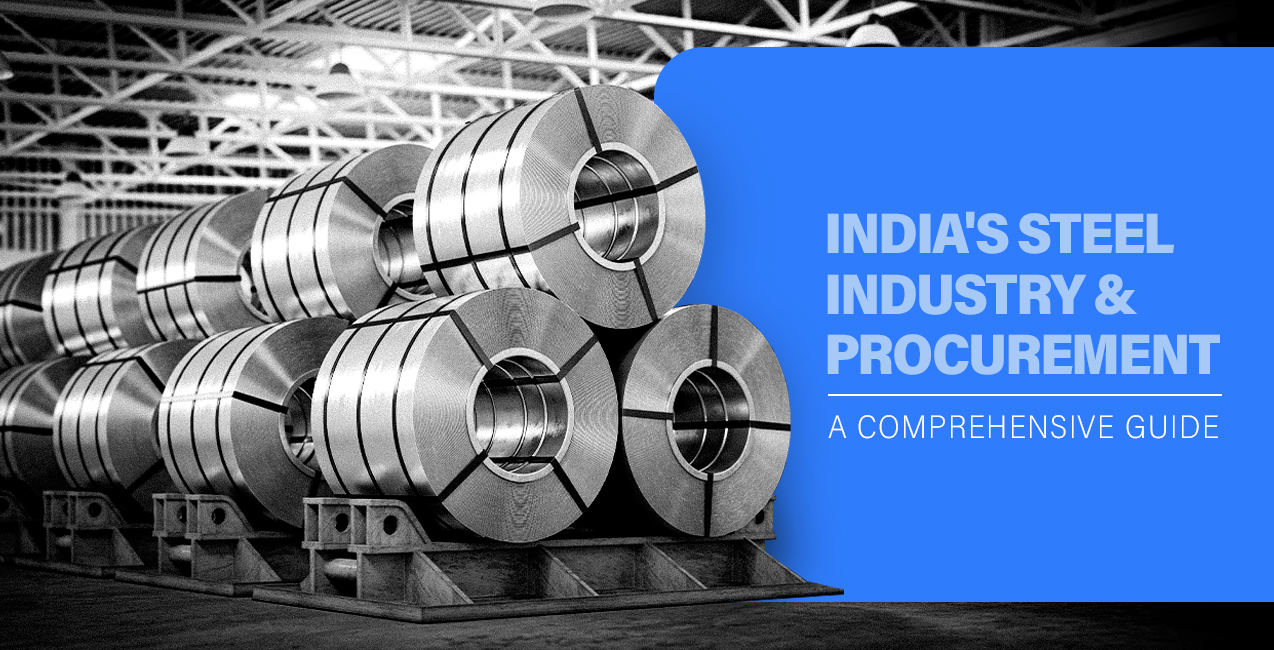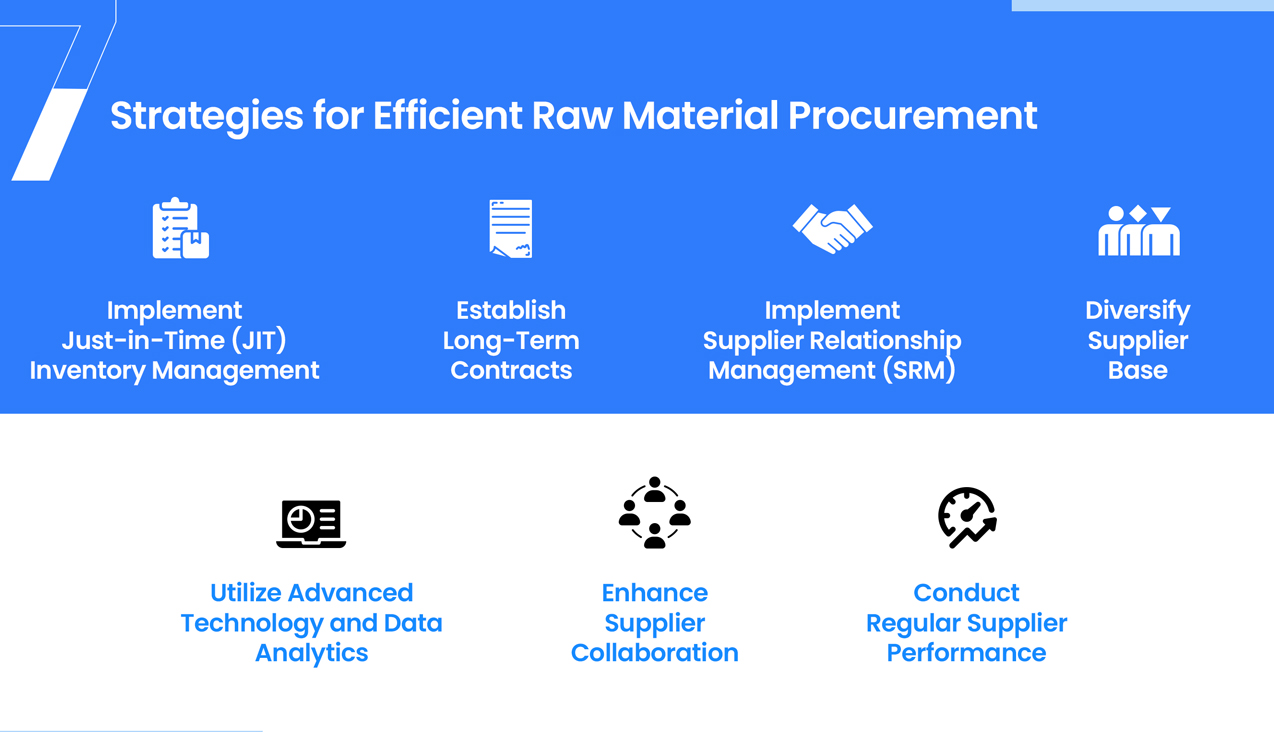Navigating The Steel Industry And Raw Material Procurement Process In India: A Comprehensive Guide

The Indian Steel Industry: An Overview
The steel industry in India has been a cornerstone of economic growth for decades. It plays a pivotal role in various sectors, including infrastructure, construction, automotive, and manufacturing. With a promising future, understanding the nuances of this dynamic sector is crucial, starting with an overview of the Indian steel industry.
Trends Shaping the Indian Steel Industry
The Indian steel industry is experiencing a profound transformation, driven by several influential trends. A comprehensive understanding of these trends is essential for anyone seeking success in this dynamic sector-
1. Growing Demand
India's rapid urbanization and ambitious infrastructure development projects have generated an insatiable appetite for steel. As the nation continues to evolve and expand, the demand for steel products has soared. The construction of modern urban spaces, bridges, highways, and high-rise buildings has become a hallmark of India's development journey.
Moreover, the automotive industry's continuous growth further fuels the demand for high-quality steel. This surge in demand is not merely a phase; it is an enduring trend that shows no signs of slowing down. Businesses in the steel sector must prepare to meet this sustained demand by optimizing their raw material procurement and production processes.
2. Technological Advancements
In an era of rapid technological progress, the Indian steel industry is embracing cutting-edge innovations to boost productivity and efficiency. Automation, the Internet of Things (IoT), and Industry 4.0 principles have become integral components of steel manufacturing. These advancements are reshaping traditional processes, making them more precise and efficient.
Robotics and data analytics are being deployed to optimize resource allocation, reduce waste, and enhance product quality. Embracing these technological shifts is imperative for staying competitive and maintaining high standards in the face of growing demand.
3. Environmental Concerns
Sustainability has emerged as a central theme in the steel industry. As global awareness of climate change and environmental conservation grows, steel producers are under increasing pressure to reduce their carbon footprint. Efforts are being made to minimize energy consumption and emissions, with a particular emphasis on adopting cleaner and more eco-friendly production methods.
Additionally, the industry is actively exploring opportunities to increase the use of recycled materials in steel production. These eco-conscious initiatives not only align with global environmental goals but also enhance the industry's image and appeal to conscientious consumers.
4. Global Integration
The Indian steel industry is no longer an isolated entity but an integral part of the global steel market. This integration brings both opportunities and challenges. On the one hand, it opens doors to a vast international market, allowing Indian steel producers to expand their reach and diversify their customer base. On the other hand, it exposes them to global competition, necessitating the need for constant innovation and efficiency improvements. Understanding and navigating this global dimension is crucial for maintaining a competitive edge in the industry.
In essence, the Indian steel industry is undergoing a profound transformation characterized by surging demand, technological advancements, environmental consciousness, and global integration. To thrive in this evolving landscape, businesses must adapt, innovate, and invest strategically to meet the growing demand while addressing sustainability concerns and navigating the complexities of the global market.
Challenges In Raw Material Procurement
Efficient raw material procurement is a linchpin of success in the steel industry. However, it comes with several challenges:
1. Price Volatility: The prices of raw materials, such as iron ore and coal, are subject to frequent fluctuations, impacting cost control.
2. Supply Chain Disruptions: Disruptions in the supply chain, whether due to geopolitical issues or natural disasters, can severely affect production schedules.
3. Quality Assurance: Ensuring the quality of raw materials is crucial to maintain product standards.
{{blog-form}}
Strategies For Efficient Raw Material Procurement
To overcome these challenges, steel companies in India employ various strategies for efficient raw material procurement:
1. Supplier Consolidation: Relying on a multiple supplier can be risky. Companies often work with single supplier to mitigate supply chain disruptions.
2. Advanced Analytics: Predictive analytics and data-driven insights are used to forecast demand and optimize inventory levels.
3. Inventory Management: Implementing just-in-time inventory systems helps reduce carrying costs and minimize the impact of price fluctuations.

The Role of Cheap Raw Material Procurement
Cheap raw material procurement is a critical factor in the competitiveness of the steel industry. The ability to secure raw materials at lower costs can significantly impact a company's profitability. This is where innovative solutions come into play.
Bizongo's Low-Cost Procurement Solutions
Bizongo, a leading player in the steel industry's raw material procurement space, offers a range of solutions tailored to address the challenges faced by businesses. Here's how Bizongo's offerings align with the need for cheap raw material procurement:
1. Raw Material Consolidation (RMC): Bizongo's platform allows businesses to consolidate their raw material purchases from strategic vendors. This consolidation reduces procurement costs by taking advantage of bulk purchases and strategic partnerships, contributing to cheap raw material procurement.
2. Vendor Digitization Platform: Digitizing the vendor ecosystem is key to efficient procurement. Bizongo's platform streamlines vendor management, standardizes processes, and provides full control over the procure-to-pay lifecycle. This not only reduces operational costs but also fosters transparency in procurement.
3. AI and ML-Powered Insights: Bizongo's state-of-the-art platform employs artificial intelligence (AI) and machine learning (ML) to provide actionable insights and predictive intelligence. These tools help optimize the supply chain, reduce supply risks, and improve raw material procurement, ultimately contributing to cheap raw material procurement.
4. Embedded Financing: Access to financing is often a bottleneck in the procurement process. Bizongo's platform offers embedded supply chain financing through a network of financial institutions. This enables businesses to grow by providing vendors with the financial resources they need for efficient raw material procurement.
5. Compliance and Risk Management: Compliance is a crucial aspect of procurement. Bizongo's platform offers tools for document management, transaction authentication, and visibility into the movement of goods. This not only streamlines compliance processes but also helps assess supply chain risks, further contributing to cheap raw material procurement.
6. Live Bidding: Bizongo's platform includes a live bidding feature, allowing businesses to participate in bidding events. This feature helps discover new revenue streams, access competitive pricing, and optimize procurement costs, aligning with the goal of cheap raw material procurement.
Optimizing Raw Material Procurement In India
In conclusion, navigating the steel industry and the raw material procurement process in India requires a deep understanding of industry trends, challenges, and strategies. The Indian steel industry continues to grow, driven by increasing demand and technological advancements.
However, efficient raw material procurement remains a critical factor in a company's success. The ability to secure raw materials at competitive prices can significantly impact profitability. This is where Bizongo's low-cost procurement solutions come into play.
Bizongo's platform offers a comprehensive set of tools and features designed to streamline procurement, reduce costs, improve transparency, and provide access to financing. By embracing these solutions, businesses in the steel industry can position themselves for success in a competitive market, ensuring cheap raw material procurement and sustainable growth in the years to come.
In a rapidly evolving industry, staying ahead of the curve is essential. By leveraging Bizongo's expertise and innovative solutions, companies can navigate the complexities of the steel industry with confidence and thrive in an era of growth and change.



